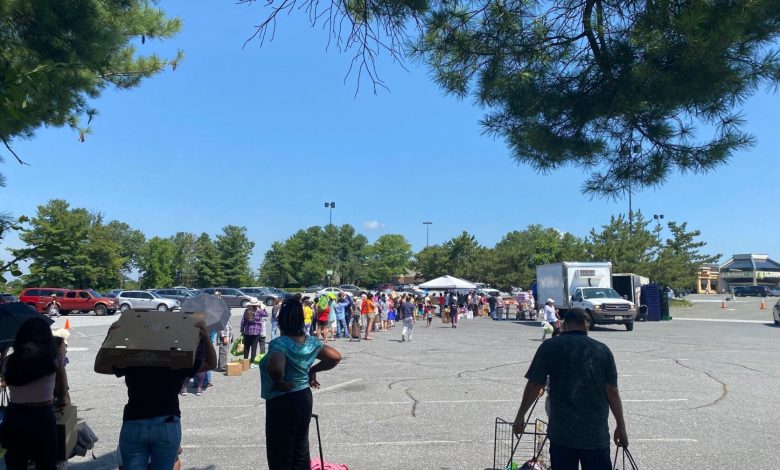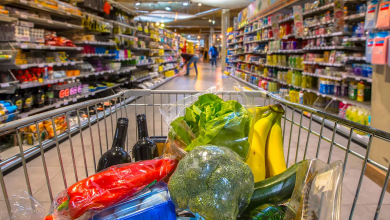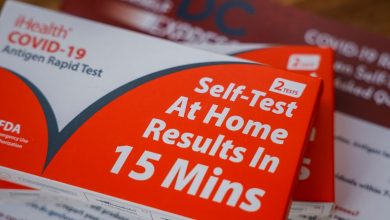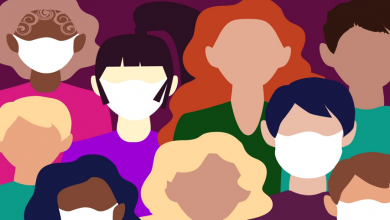‘So What Else’ can you do to help those in need in the DC area?

Hundreds gathered at the parking lot of Lakeforest Mall in Montgomery County, Maryland, Thursday, as people lined up to get free vegetables, fruits and other foods.
Six days a week from 10 a.m. to 1 p.m., hundreds gather at the parking lot of Lakeforest Mall in Montgomery County, Maryland, and people line up to get free vegetables, fruits and other foods.
When the pandemic hit, Montgomery County-based nonprofit So What Else had to stop what they focused on — providing after-school and summer camp programming to kids in the D.C. area — and pivoted to making sure that people had food on their table.
“Everybody was freaking out saying, ‘If these kids don’t get their school lunch, what are they going to do?’” said Megan Joe, who is now the operations director for the food distribution program run by So What Else.
Staff cleared out the organization’s closets and cabinets and began delivering snacks and other donations to homes of those they knew needed them.
The organization has resumed offering summer camps around the region, but the food distribution program is more active than ever. That’s because some two years later, many are still in need.
“People wouldn’t expect to see this many people standing in line for food” in Montgomery County, Joe said.
Six days a week, it is not unusual to see 100 people lining up in a parking lot at the mall with boxes, as they go through the line getting fruits, vegetables, bread and other staples.
“It’s an ‘everybody eats’ philosophy,” said Dave Silbert, one of the co-founders of So What Else. “We figure if you’re standing in line for 30 minutes in the very hot sun that you probably have a need.”
The people come from all over the county and sometimes even out of state.
On Thursday afternoon, workers and volunteers unloaded pallets of food, such as Brussels sprouts, papayas, bread, milk and others. The food comes from a network of farms, grocery stores and other nonprofits, including the Capital Area Food Bank and Manna Foods.
Between the main distribution center at Lakeforest Mall and smaller locations around D.C. and Maryland, So What else distributes over 150,000 meals a week. It even offers home delivery for people who need it.
While those who need food can get them outside of the mall, inside the mall, the nonprofit has a store front that resembles a thrift shop, with one difference — the items are free.
Another line of people, many of them mothers with small kids, go there to browse through donated clothes, toys and other items that might help around the house. There are also free diapers available to anyone who needs them.
The pandemic gave So What Else an opportunity to extend the help they give to other members of the community.
“We help everybody, especially here, we have so many senior citizens living in these apartments close by that they just walk over here,” Joe said. “The switch was honestly a blessing because we found something that we could help the community with, in addition to youth programming, and we honestly love it.
“People are still struggling out there. Gas prices are high. In the grocery store, those prices are getting higher and higher. Even though it’s post-pandemic, it doesn’t mean people don’t need help.”
It also means So What Else needs more help, too.
The organization has quadrupled in size since the pandemic because instead of just helping kids, they’re helping entire families. Just like its full name, which can be found on the T-shirts staff wear and the organization’s banners, the question is “So What Else Can We Do To Help?”
“The spirit is giving back and serving and asking what you can do to serve our community,” said Silbert. “We’re trying to bring people together, create a spirit of community.”
In the past, the organization worked with some 16,000 people, and now it’s closer to 200,000. It is committed to keeping food distribution as part of the overall mission, but it’s a nonprofit, not a small business, and the growth also comes at a cost that’s getting difficult to meet.
“We obviously don’t charge for our food, but the more people we get, the more vans and trucks we need to buy, the more food we need to get. So the costs have risen as we’ve tried to meet this demand,” Silbert said. “The better we do, the more we serve, the more resources we need.”
So What Else is hoping that those who are able to can donate what they can.
People can donate money online, or they can drop off clothing and other household items at the mall. And, if you have the time, they’ll happily take more volunteers, too, as those are needed not just in Gaithersburg, but all over the Baltimore-Washington region.
“This is a good place to live, the world is a nice place to live,” said Silbert. “We ought to take care of each other, and take care of people as much as we can.”




